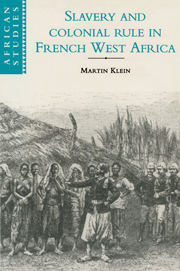Book contents
- Frontmatter
- Contents
- List of illustrations
- List of maps
- List of tables
- Preface
- List of abbreviations
- Glossary
- 1 Slavery in the Western Sudan
- 2 Abolition and retreat. Senegal 1848–1876
- 3 Slavery, slave-trading and social revolution
- 4 Senegal after Brière
- 5 Conquest of the Sudan: Desbordes to Archinard
- 6 Senegal in the 1890s
- 7 The end of the conquest
- 8 The imposition of metropolitan priorities on slavery
- 9 With smoke and mirrors: slavery and the conquest of Guinea
- 10 The Banamba Exodus
- 11 French fears and the limits to an emancipation policy
- 12 Looking for the tracks. How they did it
- 13 After the War: renegotiating social relations
- 14 A question of honor
- Appendixes
- Notes
- Bibliography
- Index
- Titles in the series
6 - Senegal in the 1890s
Published online by Cambridge University Press: 07 May 2010
- Frontmatter
- Contents
- List of illustrations
- List of maps
- List of tables
- Preface
- List of abbreviations
- Glossary
- 1 Slavery in the Western Sudan
- 2 Abolition and retreat. Senegal 1848–1876
- 3 Slavery, slave-trading and social revolution
- 4 Senegal after Brière
- 5 Conquest of the Sudan: Desbordes to Archinard
- 6 Senegal in the 1890s
- 7 The end of the conquest
- 8 The imposition of metropolitan priorities on slavery
- 9 With smoke and mirrors: slavery and the conquest of Guinea
- 10 The Banamba Exodus
- 11 French fears and the limits to an emancipation policy
- 12 Looking for the tracks. How they did it
- 13 After the War: renegotiating social relations
- 14 A question of honor
- Appendixes
- Notes
- Bibliography
- Index
- Titles in the series
Summary
Fear God in the matter of your slaves. Feed them with what you eat and clothe them with what you wear and do not give them work beyond their capacity. Those whom you like, retain, and those whom you dislike, sell. Do not cause pain to God's creation. He caused you to own them and had He so wished, He would have caused them to own you.
Teaching attributed to the Prophet MohammedThere is no use crusading in a country you cannot keep after you have conquered it.
Sir John KirkFaidherbe's success was in part due to his ability to control what his superiors knew. Briere's problems show that it became increasingly difficult to do that. Steamships stopped at Dakar. Travelers, missionaries and politicians regularly passed through. Furthermore, Senegal participated in French parliamentary democracy. The General Council discussed and controlled a large part of the colonial budget. Governors regularly clashed with councillors. Municipal councils controlled local affairs and a deputy represented them in Paris. The deputy was usually linked to one or more of the political blocs on the General Council and could bring pressure to bear on the administration. Senegal was also being converted from a colonial backwater to the center of a colonial empire. This meant a demand for literate functionaries in both administration and commerce. Literacy in turn meant that people could write letters, frame grievances and make them known. Senegal was thus a modern legal state. Arbitrariness'was restricted by the existence of a corps of citizens with rights, by an independent court system, by a free press, by institutions before which the administration was responsible.
- Type
- Chapter
- Information
- Slavery and Colonial Rule in French West Africa , pp. 94 - 107Publisher: Cambridge University PressPrint publication year: 1998

